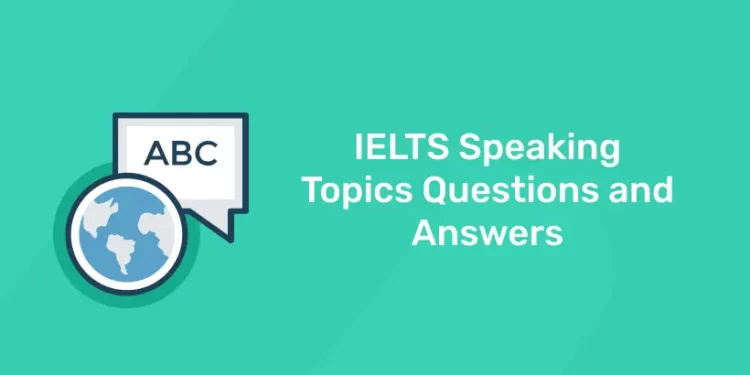Table of Contents
The IELTS Speaking test is an essential part of the IELTS exam, designed to evaluate your ability to communicate effectively in English. It involves a face-to-face interview with an examiner, testing your fluency, coherence, vocabulary, and pronunciation. The test covers a wide range of topics, from everyday life to more abstract subjects, and is divided into three parts.
In this blog, we will explore common IELTS Speaking topics, sample questions, and suggested answers to help you feel more confident and prepared for the exam. Whether you’re aiming for a high band score or simply looking to improve your speaking skills, this guide will provide valuable insights to support your preparation.
Master the IELTS Exam with Online Coaching – Enroll Today!
Introduction
Candidates must be aware of the different questions that may be asked in each component of the IELTS test in order to perform well in the speaking segment. To get a better sense of the exam’s degree of difficulty, study abroad applicants may review the most recent IELTS speaking questions and answers.
The IELTS speaking test consists of three sections, each with a distinct question structure. Together, we will go over frequent IELTS speaking subjects, along with solutions and advice on how to get a high speaking score.
IELTS Speaking Topics Questions and Answers
The IELTS Speaking test evaluates your ability to communicate effectively in English through various topics. The test is divided into three parts, and each section assesses different aspects of your speaking skills, such as fluency, coherence, vocabulary, and grammar. Below, I’ll explain some common IELTS Speaking topics and provide detailed examples of questions and answers to guide you through each part of the test.
Part 1: Introduction & Interview (4–5 minutes)
In this part, the examiner asks questions about familiar topics like your background, family, interests, or work. It’s important to answer confidently and naturally.
Common Topics for Part 1
- Hometown
- Family and Friends
- Education
- Work or Study
- Hobbies
- Daily Routine
Sample Questions and Answers
Q1. Can you tell me about your hometown?
Answer: “I come from a small town in the north of my country called [Town Name]. It’s quite peaceful and surrounded by beautiful hills and lakes. Although it’s not very big, it has everything we need, including schools, hospitals, and parks.”
Q2. What do you enjoy doing in your free time?
Answer: “In my free time, I enjoy reading books, especially fiction. I also like going for walks in the park with my friends, and on weekends, I sometimes watch movies or cook new recipes with my family.”
Q3. Do you work or study?
Answer: “I am currently a student at [University Name], where I am pursuing a degree in Business Administration. It’s a demanding course, but I find it really interesting because it covers a wide range of topics like marketing, management, and finance.”
Part 2: Long Turn (3–4 minutes)
In Part 2, you are given a task card with a topic. You have one minute to prepare, then you speak for 1–2 minutes. The topics are more personal but may require you to talk about an experience, a favorite memory, or a place.
Common Topics for Part 2
- A memorable trip
- A favorite book or film
- A person who inspires you
- A hobby or skill you enjoy
- An important event in your life
Sample Question and Answer:
Q1. Describe a place you have visited that you would like to go back to. You should say:
- Where the place is
- Why you went there
- What you did there
- And explain why you would like to go back.
Answer: “Last year, I visited a small beach town called [Place Name] for a vacation with my family. It’s located on the coast, and we chose it because we wanted a quiet and relaxing holiday. We spent most of our time on the beach, swimming, and trying local seafood. I would love to go back because the atmosphere was so peaceful, and the scenery was stunning. The sunsets were especially beautiful, and I’d like to explore more of the nearby islands.”
Part 3: Discussion (4–5 minutes)
In Part 3, the questions are more abstract and require you to express opinions or analyze issues related to the topic in Part 2. The examiner may ask follow-up questions to encourage deeper thinking.
Common Topics for Part 3
- Technology and its impact on society
- Education and learning
- Environmental issues
- The influence of media
- Globalization
Sample Questions and Answers:
Q1. How has technology changed the way we communicate?
Answer: “Technology has drastically changed the way we communicate. With the rise of smartphones and social media, it’s now easier than ever to stay connected with people across the globe. We can send messages, make video calls, and share our lives instantly. However, I think it’s also made communication less personal because we rely so much on digital interaction instead of face-to-face conversations.”
Q2. Do you think children today are more dependent on technology than in the past?
Answer: “Yes, definitely. Children today grow up surrounded by technology, and many of them use smartphones, tablets, and computers from a very young age. While technology has many educational benefits, I believe children are becoming too dependent on it. They spend less time playing outside or engaging in creative activities, which can affect their social skills and physical health.”
Q3. What role does education play in solving environmental problems?
Answer: “Education plays a crucial role in solving environmental problems. When people are educated about the impact of pollution and climate change, they are more likely to adopt eco-friendly habits. Schools can teach children about recycling, conserving water, and reducing waste. Moreover, higher education institutions can lead the way in research and innovation to develop sustainable technologies.”
Master the IELTS Exam with Online Coaching – Enroll Today!
Most Common IELTS Speaking Topics
The IELTS Speaking Test covers a wide range of topics that examine your ability to communicate effectively in English. While the questions may vary, certain topics tend to appear frequently across all parts of the test. These topics are designed to be relatable, allowing test-takers to speak naturally about familiar subjects. Below is a detailed explanation of the most common IELTS Speaking topics and why they are essential for exam preparation.
1. Hometown
Why This Topic is Common:
The examiner often begins with questions about your hometown or the place where you live because it’s something you’re likely familiar with. This allows you to relax and speak confidently right from the start.
Example Questions:
- Can you describe your hometown?
- What do you like most about your hometown?
- Is your hometown a good place for young people?
How to Prepare:
When preparing for this topic, think about key details of your hometown—such as its location, features, culture, and any landmarks. Be ready to explain what makes it unique and whether you like living there.
2. Work or Studies
Why This Topic is Common:
The IELTS Speaking test often includes questions about your current occupation or studies because it is a central part of most people’s lives. The examiner is interested in how well you can discuss routine activities.
Example Questions:
- Do you work or study?
- What is your job, and do you enjoy it?
- Why did you choose your area of study?
How to Prepare:
Think about your work or educational experiences. Be ready to explain your daily tasks, responsibilities, and how you feel about your work or studies. You may also be asked about your future career plans.
3. Family and Friends
Why This Topic is Common:
Talking about family and friends is personal and familiar, making it an ideal topic for testing your ability to speak naturally about relationships and social experiences.
Example Questions:
- Can you tell me about your family?
- How do you spend time with your friends?
- Do you think family is important in today’s world?
How to Prepare:
Be ready to describe the members of your family, your relationship with them, and how you interact with friends. Consider cultural differences in how families and friends interact, as these can add depth to your answers.
4. Hobbies and Free Time
Why This Topic is Common:
This is a common conversation starter that allows the examiner to see how well you can talk about activities outside of work or study. It also shows your ability to express opinions and preferences.
Example Questions:
- What do you like to do in your free time?
- Do you think hobbies are important for relaxation?
- How do you spend your weekends?
How to Prepare:
Be prepared to talk about your hobbies in detail, such as sports, reading, cooking, or traveling. You might also want to explain why these activities are important to you and how they benefit your well-being.
5. Travel and Holidays
Why This Topic is Common:
Travel is a universally relatable topic that allows the examiner to assess how well you can describe experiences, places, and preferences. Whether you’ve traveled extensively or not, it’s an easy subject to speak about.
Example Questions:
- Do you enjoy traveling? Why or why not?
- Can you describe your last vacation?
- Where would you like to travel in the future?
How to Prepare:
Think about past travel experiences and places you’d like to visit. Focus on describing places, activities you did, and why the experience was memorable. If you haven’t traveled much, be ready to talk about destinations you dream of visiting.
6. Education
Why This Topic is Common:
Education is a significant part of life, whether you’re a student or have completed your studies. It’s a good way for the examiner to see how you can discuss more abstract topics like learning methods or the value of education.
Example Questions:
- What do you enjoy most about your studies?
- How important do you think education is for success?
- What changes would you like to see in the education system in your country?
How to Prepare:
Think about your educational experiences, including what you like or dislike about your studies. Be prepared to discuss different aspects of education, such as subjects, teachers, and the impact of education on your future.
7. Technology
Why This Topic is Common:
Technology is deeply integrated into modern life, making it a relevant and relatable subject. The examiner may use this topic to assess how well you can express opinions on the impact of technology on society.
Example Questions:
- How has technology changed the way we live?
- Do you think people rely too much on technology nowadays?
- What are some of the benefits and drawbacks of using technology?
How to Prepare:
Be ready to discuss how technology affects your daily life, from smartphones to social media and the internet. You should be able to express both the positive and negative aspects of technology and how it influences communication, work, or education.
8. Health
Why This Topic is Common:
Health is an important topic in everyone’s life and can lead to a variety of discussions, from personal health habits to broader issues like healthcare systems.
Example Questions:
- How do you stay healthy?
- Do you think it’s important to have a balanced diet?
- What can governments do to improve public health?
How to Prepare:
Consider how you maintain your health, such as through exercise, diet, or relaxation. You might also want to think about healthcare issues in your country or globally, and be ready to discuss them.
9. Environment
Why This Topic is Common:
The environment is a global concern, and discussing it allows you to showcase your ability to talk about broader issues that affect society. This topic often involves expressing opinions and providing solutions.
Example Questions:
- What are some of the environmental problems in your country?
- Do you think individuals can make a difference in protecting the environment?
- How can governments promote environmental conservation?
How to Prepare:
Be ready to discuss environmental issues such as pollution, climate change, and conservation efforts. You should also be able to provide examples of how individuals and governments can contribute to environmental protection.
10. Culture and Traditions
Why This Topic is Common:
Culture and traditions are integral parts of identity, and they allow the examiner to see how well you can describe cultural practices and reflect on their importance in society.
Example Questions:
- What is a traditional festival in your country?
- How have traditions changed over time?
- Do you think it’s important to preserve cultural traditions?
How to Prepare:
Think about the cultural practices in your country, including festivals, customs, or rituals. Be ready to describe their significance, how they are celebrated, and whether you believe traditions should evolve or remain the same.
Common IELTS Speaking Questions
Here are some common IELTS Speaking questions, divided into three parts:
Part 1: Introduction and Interview (4-5 minutes)
This part includes general questions about yourself and a range of familiar topics.
- What is your full name?
- Where are you from?
- Do you work or study?
- What kind of work do you do? / What are you studying?
- What do you do in your free time?
- Do you enjoy listening to music? Why/Why not?
- What kind of food do you like?
- How often do you go shopping?
- Do you like watching movies? Why/Why not?
- Can you describe your hometown?
- Do you like to travel? Why/Why not?
- Do you play any sports?
- What kind of weather do you like?
- Do you use social media often?
- Do you prefer reading books or watching TV? Why?
How to Answer Part 1 Questions:
These questions are designed to be easy and relatable, so you should answer naturally. Avoid giving one-word or overly short answers; instead, aim to expand your response with examples or additional details. For example, if asked about your hobbies, don’t just say, “I like reading.” Instead, explain what types of books you enjoy and why you find reading relaxing.
Part 2: Long Turn (3-4 minutes)
The candidate is given a topic and must speak for 1-2 minutes. They get 1 minute to prepare.
- Describe a person you admire.
- Describe a place you have visited that you liked.
- Describe a recent success or achievement in your life.
- Describe your favorite childhood memory.
- Talk about a skill you would like to learn.
- Describe a time when you helped someone.
- Describe a special event you attended.
- Talk about an interesting job you would like to do.
- Describe a time you had to wait for something.
- Talk about a time when you were surprised.
How to Answer Part 2 Questions:
In Part 2, you need to structure your response clearly. Begin by introducing the topic, then describe the key points listed on the cue card, and end with a concluding thought. For example, if the topic is about a person who has influenced you, start by naming the person, explain how you know them, describe what they did that influenced you, and conclude with why you admire them.
You can use the minute of preparation time to jot down a few key points you want to mention, ensuring that you cover all aspects of the task card.
Part 3: Discussion (4-5 minutes)
These questions are a follow-up to the Part 2 topic, but focus on broader issues.
- What qualities make someone a good leader?
- How important is job satisfaction?
- Why do some people prefer to work alone?
- What are the advantages and disadvantages of living in a big city?
- Why do some people like to take risks?
- How has technology changed the way we communicate?
- Is it important to maintain traditions in society?
- How does travel affect someone’s outlook on life?
- Do you think people spend too much time on their phones?
- What are the environmental impacts of tourism?
How to Answer Part 3 Questions:
In this section, the examiner wants to see your ability to analyze, give detailed explanations, and support your opinions with reasons or examples. Make sure to extend your answers by discussing both sides of an issue when relevant. For example, if asked about the impact of technology on work, you could mention both the advantages (increased efficiency, flexibility) and disadvantages (less human interaction, job automation) of technology in the workplace.
When answering, it’s important to stay organized. Present your opinion clearly, provide supporting points or examples, and try to conclude with a summary of your thoughts.
Master the IELTS Exam with Online Coaching – Enroll Today!
Sample IELTS Speaking Answers
Here are sample answers to some common IELTS Speaking questions, organized by parts. These sample answers aim to demonstrate fluency, grammar, vocabulary, and a clear structure, which are all assessed in the speaking test.
Part 1: Introduction and Interview
Question 1: What kind of work do you do?
Sample Answer: I work as a software engineer for a tech company. My main responsibilities include developing web applications and maintaining existing systems. I really enjoy my job because it allows me to solve complex problems and work on innovative projects. It’s also very rewarding to see my work being used by people globally.
Question 2: Do you enjoy listening to music? Why/Why not?
Sample Answer: Yes, I really enjoy listening to music. It helps me relax after a long day, and it also improves my mood. I like a wide variety of music, from classical to pop, depending on how I’m feeling. Music is a great way to unwind, and I often listen to it when I’m working or traveling.
Question 3: Can you describe your hometown?
Sample Answer: My hometown is a small city in the northern part of the country. It’s surrounded by beautiful hills and forests, which makes it a peaceful place to live. Although it’s not very big, there are plenty of parks and cultural landmarks to visit. I particularly like the local food, which is a specialty of the region. It’s a quiet place, but it has everything you need.
Question 4: Do you prefer reading books or watching TV? Why?
Sample Answer: I prefer reading books because I feel that they provide a deeper understanding of topics. While TV shows are entertaining, books allow me to use my imagination and think more critically. I also enjoy the process of reading—it’s more relaxing, and I can go at my own pace. Reading helps me improve my vocabulary as well.
Part 2: Long Turn
Question 1: Describe a person you admire.
Sample Answer: One person I truly admire is my grandmother. She’s in her 80s now, but she’s still incredibly active and sharp. Growing up, she was always there for me, offering guidance and support whenever I needed it. What I admire most about her is her positive attitude toward life, no matter what challenges she faces. She’s very resilient and has lived through some tough times, but she always remains optimistic. I also admire her generosity. She’s always willing to help others, whether it’s through volunteering or simply being a great listener. She inspires me to be more patient, kind, and strong.
Question 2: Describe a memorable trip you have taken.
Sample Answer: One of the most memorable trips I’ve taken was to Japan two years ago. I went there with my family during the spring season, specifically to see the famous cherry blossoms. We spent two weeks traveling to various cities like Tokyo, Kyoto, and Osaka. In Tokyo, we visited iconic places like the Shibuya Crossing and Tokyo Tower, while in Kyoto, we explored ancient temples and traditional gardens. The highlight of the trip was seeing the cherry blossoms in full bloom; it was a truly magical experience. This trip was memorable because it allowed me to immerse myself in a different culture, taste amazing food, and learn about Japan’s rich history. The beautiful scenery, combined with the friendly people and unique experiences, made it a journey I will never forget.
Part 3: Discussion
Question 1: What qualities make someone a good leader?
Sample Answer: I believe that a good leader should possess several key qualities. First and foremost, they need to be able to communicate effectively. A leader must clearly express their vision and expectations to their team. Secondly, they need to be empathetic, understanding the needs and concerns of others. This helps them create a supportive environment. Lastly, a good leader should be decisive, able to make tough decisions confidently. These qualities combined ensure that a leader can guide their team toward success.
Question 2: How important is job satisfaction?
Sample Answer: Job satisfaction is extremely important for both personal well-being and professional success. When people are satisfied with their jobs, they tend to be more motivated and productive. It also affects mental health, as people who enjoy their work are less likely to experience stress or burnout. Moreover, satisfied employees are more loyal to their companies and contribute positively to the work culture, leading to better overall performance.
Question 3: How has technology changed the way we communicate?
Sample Answer: Technology has drastically changed the way we communicate, making it faster and more convenient. With the rise of smartphones, social media, and messaging apps, we can now stay connected with people from all over the world in real-time. This has made both personal and professional communication more efficient. However, I also think it has led to a decline in face-to-face interaction, which is an important aspect of human relationships. Despite this, technology has definitely made it easier to maintain long-distance connections.
Tips for Scoring Well in IELTS Speaking
1. Be Fluent and Coherent
- Speak naturally and fluently without too many long pauses. Focus on delivering your ideas clearly and in an organized manner.
- Use linking words (e.g., “firstly,” “on the other hand,” “however”) to connect your ideas smoothly, which will help your coherence.
2. Expand Your Answers
- Avoid giving very short or one-word answers. Always try to extend your responses by explaining, giving examples, or elaborating on your ideas. For instance, if asked, “Do you enjoy traveling?” don’t just say, “Yes, I do.” Instead, explain why you enjoy it.
3. Use a Range of Vocabulary
- Show your range of vocabulary by using synonyms, idiomatic phrases, and less common words where appropriate. Avoid repeating the same words too often.
- If you’re talking about your job or hobbies, use specific terms related to that field to demonstrate your command of the language.
4. Demonstrate a Variety of Sentence Structures
- Use a mix of simple, compound, and complex sentences. Avoid sticking to very basic sentence structures. For example, instead of “I like to read,” you could say, “I enjoy reading a variety of books because it helps me relax and learn new things.”
5. Practice Pronunciation
- Work on pronouncing words clearly. You don’t need to have a native accent, but make sure you are understandable. Pay attention to your intonation and stress the right syllables in words.
- Practice difficult sounds or words you tend to struggle with. For example, if you have difficulty with “th” sounds, focus on mastering them before the test.
6. Stay on Topic
- In Part 2 (Long Turn), make sure you fully address the prompt and stay on topic. If you’re asked to talk about a person you admire, focus on that and don’t drift off into unrelated topics.
- Keep the examiner engaged by staying relevant to the question, but don’t memorize answers—they should sound natural.
7. Don’t Worry About Mistakes
- If you make a mistake, don’t panic. You can quickly correct yourself without it affecting your score negatively. For instance, “I went to… sorry, I mean I have been to Italy.” Correcting yourself shows you’re aware of your error.
8. Be Confident and Maintain Eye Contact
- Confidence is key. Speak clearly and maintain eye contact with the examiner. It shows that you’re engaged in the conversation and not too nervous.
- Smiling can also help you feel more relaxed and improve the overall tone of your voice.
9. Use Pauses Wisely
- It’s okay to take a brief pause to think, especially in Part 2 when you have to speak for 1-2 minutes. Use phrases like “Let me think about that for a moment” or “That’s an interesting question” to give yourself time.
- Avoid overusing fillers like “um” or “uh.” Instead, take a short pause and gather your thoughts.
Master the IELTS Exam with Online Coaching – Enroll Today!
10. Practice with a Timer
- For Part 2, practice speaking for 1-2 minutes on a variety of topics. Use a timer to ensure you’re comfortable with the timing. This will help you organize your speech and speak at a natural pace without rushing.
Ace Your IELTS Exam with Confidence!
Unlock your potential with our expert-led IELTS preparation course. Achieve your dream score and open doors to global opportunities!
Start Your IELTS Journey Today!Frequently Asked Questions
What are the common topics asked in IELTS speaking?
Is IELTS Speaking difficult?
How to score in IELTS speaking test?
- Fluency and coherence (FC) = how clear and structured is your speech. To increase score for FC:
- Lexical Resource (LR) = how good is your vocabulary.
- Pronunciation (P) = how naturally you sound.
- Grammatical Range and Accuracy (GRA) = how good is your grammar.









